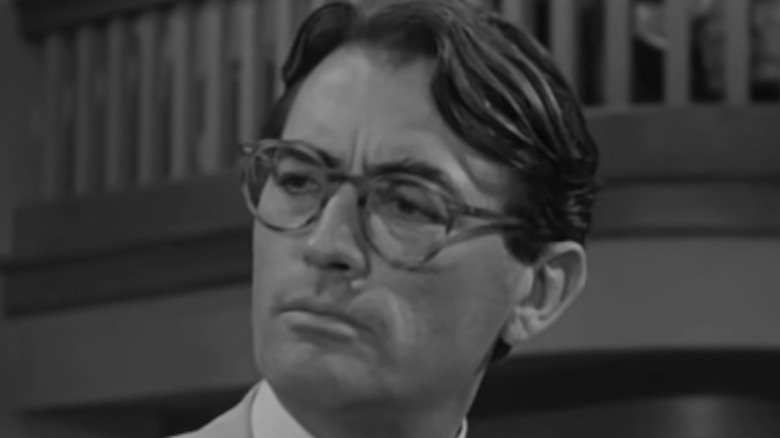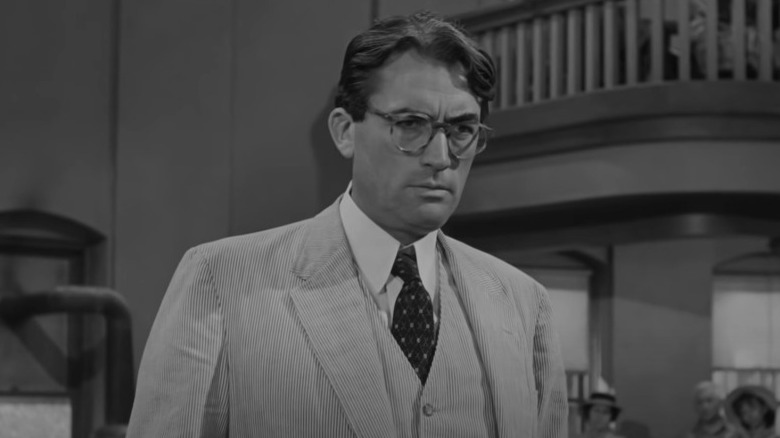Is To Kill A Mockingbird Based On A True Story?
If you attended public school in the United States, chances are that you were at some point tasked with reading "To Kill a Mockingbird" by Harper Lee. Published in 1960, this classic piece of American literature won the Pulitzer Prize for Fiction in 1961 and has since sold millions of copies all over the world (per Time Magazine).
Set during the 20th century in rural Alabama, the story is told through the eyes of a little girl named Scout. Scout and her older brother Jem live with their father, Atticus Finch, a lawyer whose steadfast moral compass and belief in the sanctity of the law are central to the novel. "To Kill a Mockingbird" touches on political subjects such as flaws in the justice system and racial inequality, as well as topics like bravery, friendship, and compassion.
When examined closely, readers will notice that certain aspects of the plot draw a parallel with author Harper Lee's own childhood. These details beg the question: Is "To Kill a Mockingbird" based on real events? We delve further into the theory below.
Harper Lee's early life
Harper Lee was born Nelle Harper Lee in 1926. Just like Scout, Lee was born in Alabama, where the novel takes place. However, Harper Lee was born in the real town of Monroeville, Alabama, while "To Kill a Mockingbird" takes place in a fictional town called Maycomb.
Like the novel's young narrator, Harper Lee's father was also a lawyer (per Time Magazine). In "To Kill a Mockingbird," Atticus Finch's staunchly held beliefs are central to Scout's understanding of the events unfolding around her. Much of "To Kill a Mockingbird" concerns a legal case Atticus takes on involving a Black man who stands falsely accused of assaulting a white woman. It's entirely possible that Harper Lee's writing was influenced by a case her father defended when she was a child, wherein he defended two Black men who had been accused of murder.
The parallels don't stop there! It's a commonly held belief that Harper Lee's childhood friend, none other than "In Cold Blood" author Truman Capote, was the inspiration for the character of Scout's friend Dill Harris (via The New York Times) (and if you are looking for a great movie inspired by a true story, you can learn more about Truman Capote's life and work in the 2005 film "Capote"). With all this in mind, it's safe to say that Harper Lee most likely drew from her own life while writing "To Kill a Mockingbird." Whether or not the book is based entirely on a true story, though, "To Kill a Mockingbird" led to an incredible film adaption — and a controversial sequel.
To Kill a Mockingbird's runaway success
"To Kill a Mockingbird" was such a hit that a film adaptation starring Gregory Peck as Atticus Finch premiered in 1962. The movie was nominated for eight Academy Awards (per IMDb). For his portrayal of one of cinema's most memorable father figures, Gregory Peck took home the Oscar for Best Actor.
An unexpected sequel to "To Kill a Mockingbird," titled "Go Set a Watchman," was published in 2015 (per The New York Times). The novel follows a 26-year old Scout, now going by her given name of Jean Louise, as she returns to her hometown and grapples with the societal norms she finds there.
At present, there is no film adaption of "Go Set a Watchman," nor is one planned. Widely considered to be an early draft of "To Kill a Mockingbird," the sequel's release was steeped in controversy before it was even published. Along with her advanced age, Harper Lee has previously stated that she would never release another book, leading to suspicion that "Go Set a Watchman" was published without the author's consent. Readers were also left reeling by the novel's plot, which depicts Atticus Finch as a racist trying to curtail civil rights advancements (via The Guardian).
Since "To Kill a Mockingbird" contains so many parallels to Harper Lee's life, it makes you wonder which novel is closer to the truth. Perhaps "To Kill a Mockingbird" was Lee's attempt to reconcile fond memories from her childhood with the harsh realities of racism in the Deep South.


